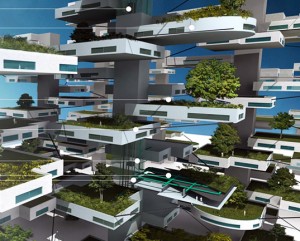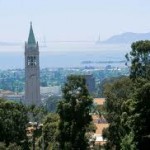 This amazing vertical farm recently took first place in the recent HP Skyline 2020 Competition to reinvent India’s skyline. Dubbed “The City and the Skyline”, the project responds to the growing crises of water, housing, food and energy. The multi-tiered self-sufficient vertical farm is composed of modular housing units that can be added as needed. The competition yielded some truly noteworthy designs that challenge our traditional notions of what a skyline is supposed to look like. The objective was
This amazing vertical farm recently took first place in the recent HP Skyline 2020 Competition to reinvent India’s skyline. Dubbed “The City and the Skyline”, the project responds to the growing crises of water, housing, food and energy. The multi-tiered self-sufficient vertical farm is composed of modular housing units that can be added as needed. The competition yielded some truly noteworthy designs that challenge our traditional notions of what a skyline is supposed to look like. The objective was
not just a meandering line etched in the sky. Not just a cutout or silhouette. Beyond restricting definitions, skylines can be seen as infusions of perception, imagination and desire. Every time a building mushrooms in a city, the skyline is altered. But transformation, not change, is the goal of invention. We invite designs concepts for an iconic structure — building, tower and institution — that can change the perception of the urban skyline.
See the objectives of the campaign here
 Winners were:Participants – Anto Gloren, Sayali Athale, Pune – Jury Comments
Winners were:Participants – Anto Gloren, Sayali Athale, Pune – Jury Comments
Sen Kapadia : New image of future cities with high density but loose clustering. Very sociable and humane living. Circulation needs clarification. This seems the ideal direction for changing the skyline, not visual but really culturally and ecologically sustainable. Variable elevations of different clusters promise also a future visual delight. Vary attainable proposal without demand on high technology.
John Hantz
Hey Detroit, the world is watching. The city has been the poster child for a lot of things, and now it is in the spotlight for urban agriculture. It’s like a fascinating science experiment: take vast swaths of vacant land, add an under-employed populace and a dash of food desert, and who knows what you might end up with. Growing food in the city is not new. Many African Americans who migrated here from the South for factory jobs in the ’20s had green thumbs, as did immigrants from European countries like Poland and Malta. Read on
On Labor Day, How We Can Give Both Workers and Our Environment a Chance
Kimberly Freeman Brown and David Foster
This Labor Day, America is facing a dizzying array of problems, none more acute than the twin crises of how poorly we treat our workers and how appallingly we treat our planet. In case anyone believes these issues are distinct and need to be addressed separately, let’s remember some of this year’s grisly headlines: Read on

